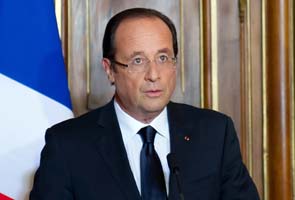
File photo
Hollande will visit Mali on Saturday with Defence Minister Jean-Yves Le Drian and Development Minister Pascal Canin, his office said, three weeks after French troops launched a surprise intervention against Islamists in its former colony.
The trip comes as troops are gathered at the gates of Kidal, a sandy northeastern outpost that is the last rebel stronghold in the poor west African country, poised to secure the town after capturing its airport on Wednesday.
In the fabled city of Timbuktu, a school reopened on Friday for the first time since a March coup in Bamako which paved the way for the Islamists to seize towns across northern Mali, taking control of an area as large as Texas.
"When the Islamists took control they wanted to re-open the school, but on their terms: a different curriculum, lessons in Arabic, girls separated from boys and forced to wear veils. We refused," said teacher Aichatou Amadou.
But the joy of citizens throwing off the yoke of brutal Islamist rule, where they were denied music and television and threatened with whippings, amputations or execution, has been accompanied by a grim backlash against light-skinned citizens seen as supporters of the Al Qaeda-linked radicals.
Rights groups have reported summary executions by both the Malian army and the Islamists.
Human Rights Watch detailed the killing of at least 13 suspected Islamist supporters in the central garrison town of Sevare.
The victims were shot and dumped into wells, said the watchdog, a report corroborated by other rights groups.
These abuses took place as the Islamists seized Konna, north of Sevare, in a push into government-held territory which sparked France's surprise intervention on January 11 amid fears the entire country could become a haven for terrorists.
In Konna, another five people were "disappeared", their relatives and neighbours told Human Rights Watch.
"Malian authorities have turned a blind eye to these very disturbing crimes," said senior West Africa researcher Corinne Dufka, calling for an investigation.
-- 'Living together won't be possible in near future' --
The Malian army denied any crimes by its troops.
"The Malian army is a republican army that does not commit abuses, contrary to certain opinions," army spokesman Souleymane Maiga said on Thursday.
Mali's military was humiliated at the hands of armed rebel groups in the north, whose members are mostly light-skinned Tuaregs and Arabs, before the French army swept to their aid.
Human Rights Watch said the Islamists were implicated in the execution of at least seven Malian soldiers in Konna, slitting their throats or shooting them in the mouth.
With fears of reprisal attacks high, many Arabs and Tuaregs have fled.
"The Arabs are gone. They're lucky, because we had a sad fate in store for them," said Ousmane, a local shopkeeper in the town of Gao.
"Living together won't be possible in the near future. We're still bearing the scars of the (Islamists') abuses," said another resident, Alassane Mamane.
The French-led troops -- which now number about 3,500 -- have met little resistance in their campaign to free northern Mali, with many of the extremists believed to have slipped into the desert hills around Kidal since France launched air strikes on their bases.
Heavy air strikes have rained down on Islamist command centres, depots and training camps in the mountainous region near the Algerian border in recent days, a French military spokesman told journalists Thursday.
France is keen to hand over its military operation to nearly 8,000 African troops slowly being deployed.
UN officials said planning was at an advanced stage to gather those forces together under the umbrella of a formal UN peacekeeping operation.
No comments:
Post a Comment